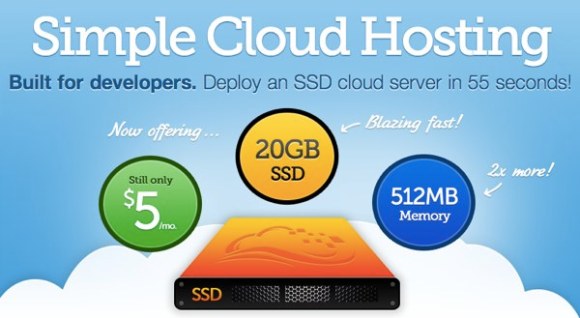
Cloud hosting startup Digital Ocean announced its first round of funding today – $3.2 million from IA Ventures, CrunchFund and TechStars. See TechCrunch, GigaOM and Pando Daily for coverage of the news (and see the comments on Hacker News).
The company is growing revenue and customers by 30% a month, and had 50x growth from December 2012 to May 2013. Thousands of customers have been grabbed from competitors like Amazon and Rackspace. When Netcraft called Digital Ocean’s growth “meteoric,” they weren’t kidding.
I first heard about Digital Ocean from Nik Cubrilovic. Nik urged me to take a look and try to invest in the company if we could. Digital Ocean has crushed the traditional price/feature tradeoff for hosting. From Nik:
I first heard about Digital Ocean almost a year ago and its name kept coming up every few weeks, which prompted me to finally take a look. It took me 30 seconds to signup, and I immediately realized what they had done – they broke the traditional price/features tradeoff and were somehow offering a great control panel, a great API and a great service with features usually reserved for high-end services at a low VPS price. They were outside of the traditional hosting tradeoff quadrant of price/features. I fired up one server to test them out and the benchmarks came back with numbers that were as good as what other IaaS providers were charging 3-5x the price for.
They have combined the low costs of low end commodity VPS providers with the features of high-end IaaS providers, it seems so obvious now but nobody has been able to pull it off until Digital Ocean.
I have cancelled two low-end VPS services and 30% of my AWS servers so far, with a view of also migrating PaaS hosted apps at Heroku and AppEngine (such as my own personal website) to Digital Ocean as well. The great recent news is that like AWS, Digital Ocean is now available as a provider in Vagrant:
Digital Ocean provider plugin:
https://github.com/smdahlen/vagrant-digitalocean
If you are a developer who deploys apps to servers and aren’t using Vagrant I strongly recommend you check it out. It sets up virtual servers for development that can then be pushed to the cloud. After initially setting up Vagrant and provisioning with either shell scripts, Ansible, Chef (solo or server) or Puppet (apply or agent) it is a single command to push your development environment up to a new Digital Ocean instance. You will need to scale it automatically and provide your own load balancing using either DDNS or nginx, but you get very close to building your own Heroku or AppEngine type stack with your own customizations, no lockin and at a fraction of the price.
This combination has changed the way I work and has made it easier for me to drop in and out of other projects with developers without spending time on servers configuring. I can’t recommend Digital Ocean enough to other developers, my tip would be to start small with non-critical apps to get a feel for the platform and then work from there – especially by using Vagrant or any other tools (even in-house continuous integration or deployment scripts using their very simple to understand and use API) to automate. Digital Ocean allows you to assemble cloud stacks like lego bricks rather than the completed tool Heroku or AppEngine give you, and you get service as good as more expensive options, for what they do, at low end VPS prices.
Just how much better is Digital Ocean than its competitors? For the lowest end hosting, we’re talking about 10x the performance for 1/3 the cost:
The 512MB server at Digital Ocean, which is the smallest size they have, is $5 per month or $0.007 per hour. Its UnixBench score is 1060.5 on average, IO is 279MB/sec and bandwidth 21MB/sec. Here are the details:
http://serverbear.com/1988-512mb-ssd–1-cpu-digitalocean
To get the equivelant performance on AWS from a single server, you have to step up all the way to an extra-large instance, which is $374 per month (!), compare the scores and graph here:
http://serverbear.com/240-extra-large-amazon-web-services
The cheapest AWS server is the Micro, which is $15 per month, its performance scores are approximately 10% of the cheapest digital ocean server:
http://serverbear.com/166-micro-amazon-web-services
some might complain that AWS isn’t suited to benchmarks, especially the Micro instance which is throttled, but the difference is just too large to ignore.
Digital Ocean was founded by Ben Uretsky, Mitch Wainer, Jeff Carr and Moisey Uretsky. We are extremely happy to be investing in the company – saving developers a ton of money on hosting while also giving them a product they adore is a surefire recipe for success.